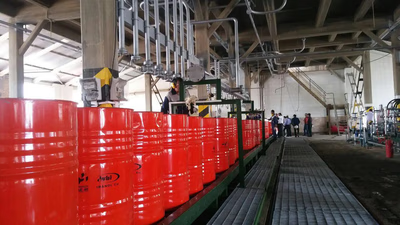
High-quality engine oil ensures optimal performance and longevity.
Engine oils are classified into different viscosity grades, such as 5W-30 or 10W-40. The viscosity grade represents the oil's resistance to flow at different temperatures. High-quality oils are formulated to maintain their viscosity within the specified range, ensuring proper lubrication and protection across a wide range of operating conditions. Engine oils can be formulated using different base oils, such as mineral oil or synthetic oil. Synthetic base oils, derived through chemical processes, generally offer superior performance compared to mineral base oils. They provide better lubrication, thermal stability, oxidation resistance, and resistance to viscosity breakdown, making them a hallmark of high-quality engine oils.
Engine oil quality is evaluated through performance testing, which assesses factors like lubrication effectiveness, wear protection, deposit control, and compatibility with emission control systems. High-quality oils undergo extensive testing to ensure they meet or exceed performance requirements. It's crucial to select engine oils that meet the specifications and recommendations of the vehicle manufacturer. Following these guidelines and using high-quality engine oils can help maintain engine health, extend its lifespan, improve fuel efficiency, and ensure optimal performance under various operating conditions.
Engine oil is one of the most important essentials for a car engine. Therefore, choosing the right and quality engine oil is very important. If the engine oil you choose is not suitable for the engine or is of poor quality, it will cause serious damage to the car engine, which will cost you dearly. In this article, we have reviewed everything you need to know to choose the best engine oil. It is not bad to know a few points in this regard, which are:
- Avoid buying engine oils that have black spots and smell.
- When buying, pay attention to the standard logo and emblem of the manufacturing company.
- Avoid buying engine oil that is old.
- Pay good attention to the type of product packaging.
Engine oils contain various additives to enhance their performance characteristics. High-quality oils incorporate a balanced and effective additive package. These additives include detergents, dispersants, anti-wear agents, antioxidants, corrosion inhibitors, and friction modifiers. The additive package helps maintain engine cleanliness, prevent sludge and deposit formation, reduce wear, control oxidation, and improve fuel efficiency. The American Petroleum Institute (API) establishes standards and certifications for engine oils. API certification ensures that the oil meets specific quality and performance requirements. The API certification label, often displayed as "API SN" or similar designations, indicates that the oil has undergone rigorous testing and meets the industry standards for engine protection and performance.
Original Equipment Manufacturers (OEMs) often specify certain engine oil requirements for their vehicles. These specifications ensure compatibility and optimal performance with specific engines. High-quality engine oils may carry OEM approvals or meet the recommended specifications of major vehicle manufacturers, indicating their suitability for use in particular engines. Engine oils may adhere to various international standards, such as the International Lubricant Standardization and Approval Committee (ILSAC) or European Automobile Manufacturers Association (ACEA) standards. These standards define specific performance requirements for engine oils, including viscosity, oxidation stability, detergent/dispersant properties, and more. Complying with these standards is indicative of a high-quality product.
-

Engine oil plays a crucial role in the lubrication and protection of automotive and industrial engines. It forms a protective film between moving parts, reducing friction and wear, which minimizes engine damage and extends lifespan. Engine oil also aids in cooling and cleaning by carrying away heat and contaminants. Various types of machinery, including generators, pumps, and heavy-duty equipment, rely on engine oil for optimal performance. Different applications necessitate specific grades of engine oil as per manufacturers" recommendations to ensure proper lubrication. Regular maintenance, including timely oil changes, is essential for maintaining performance and longevity. The primary functions of engine oil include lubrication to minimize friction, cooling internal components to prevent overheating, sealing between pistons and cylinders, and cleaning to reduce rust and sludge buildup. Marine engines require specialized oils that withstand harsh conditions like humidity and saltwater exposure.
Additionally, agricultural machinery, construction equipment, recreational vehicles (RVs), and motorcycles depend on tailored engine oils for efficient operation under demanding conditions. Understanding the specific needs of each application is vital for selecting the right engine oil. "
-

Motor oil production in West Asia is closely linked to global crude oil prices, as motor oils are derived from crude oil. Countries like Saudi Arabia, Iran, Iraq, and the UAE are significant players in this market. Their domestic oil production levels can influence the availability of crude oil for refining into motor oils, impacting production costs and prices. OPEC"s decisions on production levels also play a crucial role in shaping global oil prices, which directly affect motor oil pricing strategies in the region. The demand for motor oils globally is another critical factor; fluctuations can lead to changes in production levels and pricing strategies among West Asian producers. The region boasts advanced motor oil industries with established facilities that compete for both domestic and international market share. Factors such as government regulations, technological advancements, and varying regional market dynamics further influence production capabilities and pricing structures. Investments in refining infrastructure have enhanced the ability of these countries to process crude oil into high-quality motor oils efficiently.
Additionally, the diverse range of engine oils available—varying by type, viscosity, quality, and brand—contributes to a wide price spectrum in the market. As West Asia continues to innovate and adapt to changing market demands, its role as a key player in the global motor oil industry remains significant. "
-

Engine oils are essential for the lubrication and protection of various engine types, including gasoline, diesel, and high-performance engines. Each type of engine oil is formulated to meet specific operational demands, such as temperature extremes and high RPMs. Conventional mineral oils provide basic lubrication but may fall short under extreme conditions. In contrast, synthetic oils offer superior performance with enhanced thermal stability and oxidation resistance, making them ideal for modern and high-performance engines. Motorcycle oils cater to the unique requirements of two-stroke and four-stroke engines, while racing oils are designed for extreme conditions encountered in motorsports. Diesel engine oils contain additives to manage soot and wear due to higher compression ratios. The market offers a range of options including semi-synthetic blends that combine the benefits of both synthetic and conventional oils. High mileage oils are tailored for older engines, helping to condition seals and reduce oil consumption.
Engine oil classifications include Group III (mineral), Group IV (PAO), and Group V (esters). Industry standards from organizations like API ensure that these oils meet performance requirements for viscosity, oxidation resistance, and wear protection. The diverse market allows consumers to select products based on their specific needs, preferences, and budget.
-

Engine oil, essential for internal combustion engines, serves multiple functions including lubrication, cooling, and cleaning. It reduces friction and wear between moving parts, preventing damage and ensuring longevity. Engine oils are derived from mineral or synthetic bases, enhanced with additives for improved performance. Modern vehicles often feature oil life monitoring systems that optimize oil change intervals based on engine conditions. Synthetic oils outperform conventional oils in extreme temperatures and offer better fuel efficiency but come at a higher cost. Proper viscosity is crucial; it affects flow and protection under varying temperatures. Regular oil changes are necessary to maintain engine health. Additionally, used engine oil poses environmental risks if not recycled properly, necessitating adherence to disposal regulations. Understanding the specific requirements for different engines is vital for optimal performance.
-

Engine oils are categorized by viscosity grades like 5W-30 and 10W-40, indicating their flow resistance at varying temperatures. High-quality oils maintain viscosity, ensuring effective lubrication and protection under diverse conditions. They can be mineral or synthetic, with synthetic oils generally outperforming mineral ones in terms of lubrication, thermal stability, and oxidation resistance. Quality assessment involves performance testing for lubrication effectiveness, wear protection, and compatibility with emission systems. Selecting the right engine oil is crucial for maintaining engine health and efficiency; poor quality oil can lead to significant engine damage. Key considerations when purchasing include avoiding oils with black spots or unpleasant odors, checking for standard logos, ensuring freshness, and examining packaging quality. High-quality oils contain a balanced additive package that enhances performance by preventing sludge formation and reducing wear. The American Petroleum Institute (API) sets standards for engine oils; certification indicates compliance with industry requirements.
Original Equipment Manufacturers (OEMs) specify oil requirements to ensure compatibility with their engines. Adhering to international standards like ILSAC or ACEA further signifies a product"s quality. "





